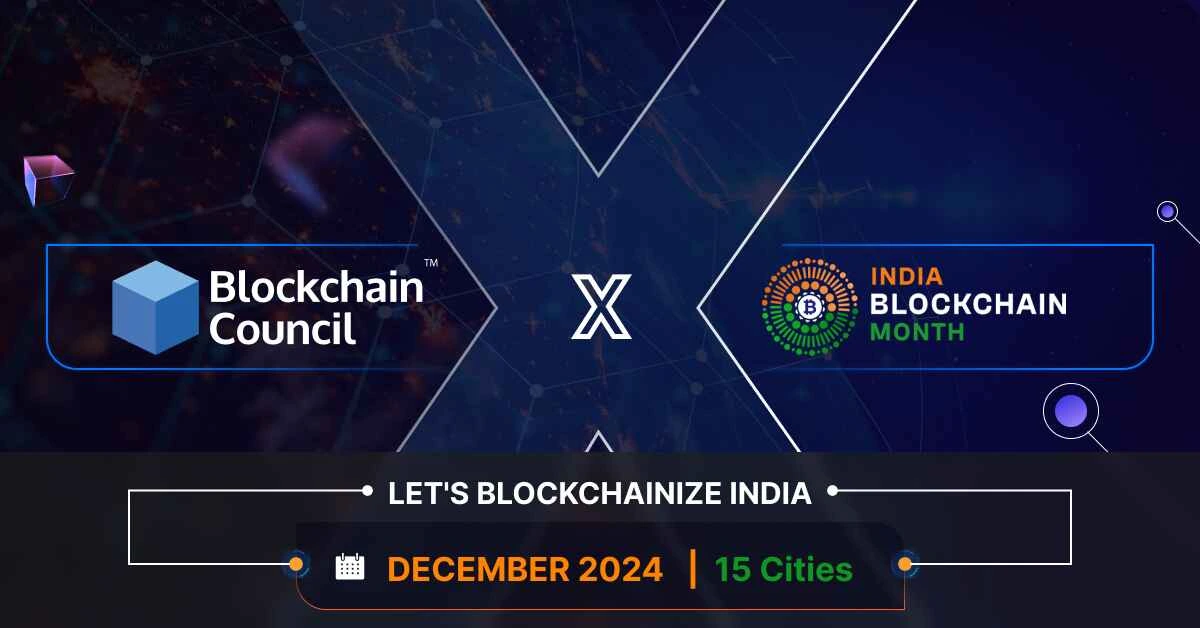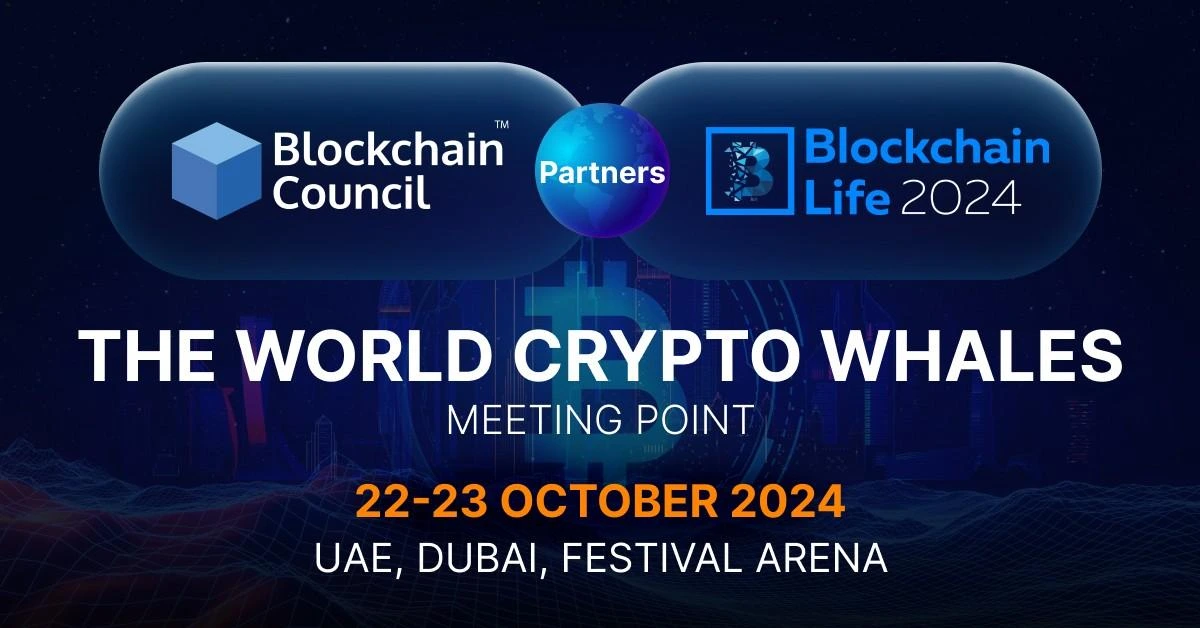
Blockchain Council Partners with Consensus Hong Kong 2025
Blockchain Council is excited to join Consensus Hong Kong 2025 as a Community Partner. This event is one of the biggest gatherings for Blockchain, digital
Home » Understanding Blockchain » How To Become A Blockchain Specialist?

Blockchain is getting mainstream nowadays, with multiple industries plunging into industrial Blockchain development and scaling in different forms. From education to heavy-duty data management applications like supply chain and logistics, Blockchain is building it all. Blockchain is an immutable shared ledger that facilitates business network transactions by recording every data transaction on the network. It also offers asset tracking and management to the network. These assets can be tangible or intangible, like cash, car, land, copyrights, patents, branding, and intellectual property. In short, Blockchain technology enables the user to keep a record of virtually anything holding value.
In this article, we’ll take you through the most efficient path to learning Blockchain and becoming a Blockchain specialist. From the most efficient and best courses to master the basics of Blockchain to developing advanced skills in smart contract development, a decentralized application (dApp) creation, and more – we’ll also explore the in-demand skills needed to succeed in the field, the best ways to learn about Blockchain technology, and some of the most important technical concepts and job opportunities available in the domain.
As we gradually prioritize communication efficiency, safety, and security, data transmission speed and rate are also becoming important. This is why Blockchain has become far more important than other Web3 technologies; businesses have shifted towards a decentralized and distributed technical architecture, and the demand for skilled Blockchain specialists and professionals has increased rapidly over the last few years.
Blockchain Specialist is an individual skilled in technical aspects of Blockchain technology that can be used by businesses, enterprises, or an organization to build, market, and scale any product or service. These individuals can cater to companies in various ways, like building a decentralized ecosystem consisting of decentralized applications, smart contracts, digital assets, Blockchain-based supply chain solutions, and many others. And that’s not it.
Besides development, Blockchain specialists are also required to draft and develop strategies to scale using Blockchain-based technologies like cryptocurrency, NFTs, digital assets, decentralized autonomous organizations, decentralized social media, and several others. Blockchain specialists are in high demand due to a sudden supply and demand imbalance in the market.
To start your journey in this one of the most rapidly growing Web3 technologies, you must understand that this field requires a combination of technical expertise, experience, and a deep understanding of Blockchain technology. Since Blockchain is a relatively new career option and not many people know about the scope of roles and responsibilities they might cater to, here is a brief description of what you can or might do as a Blockchain specialist for a company. Since there are two popular market sectors, SaaS and PaaS, we will discuss these two in detail and will briefly explain other sectors like FMCG, Finance, Healthcare, and others.
In the SaaS market, a Blockchain specialist is responsible for building and maintaining Blockchain-based decentralized applications that can be delivered to customers as a service. Their responsibilities include working closely with other software developers, project managers, and business analysts to ensure that the Blockchain-based decentralized applications meet customer requirements and fulfill the demand with utmost satisfaction. Additionally, their responsibilities include developing smart contracts, implementing consensus algorithms, and ensuring the security and scalability of the Blockchain network. They may also be responsible for analyzing Blockchain data to identify trends and patterns that can be used to improve the customer experience.
In the PaaS market, a Blockchain specialist is responsible for designing and implementing Blockchain-based decentralized platforms that developers can use to build and deploy their applications. Responsibilities are similar to the SaaS domain. Here, a Blockchain specialist also has to work closely with other software developers and project managers to ensure that the platform is easy to use and caters to the requirements of developers. Their responsibilities include developing APIs, creating developer tools, and providing technical support to platform users.
A person with technical expertise in Blockchain can bring immense value to a company that offers product-based services such as metaverse, NFTs, or cryptocurrencies. Their responsibilities may include designing and developing Blockchain-based systems, ensuring the security and scalability of the Blockchain network, and implementing consensus algorithms and smart contracts.
They can also help the company identify new use cases for their products and improve the user experience by analyzing Blockchain data to identify patterns and trends. They may be responsible for training other team members on using and implementing Blockchain technology and ensuring compliance with relevant regulatory frameworks.
In other existing market domains, such as healthcare, finance, logistics, and supply chain, a Blockchain specialist is responsible for designing and implementing Blockchain-based systems that address the unique needs of each industry. For example, in the healthcare sector, they may be responsible for building a Blockchain-based system that securely stores and shares patient data across healthcare providers. In the finance sector, they may be responsible for developing a Blockchain-based payment system that is fast, secure, and cost-effective. In the logistics and supply chain sector, they may be responsible for building a Blockchain-based system that tracks the movement of goods from the manufacturer to the end user.
Here are some of the key skills that a Blockchain specialist must have:
Learning Blockchain is as easy as learning any other conventional tech, but the way is slightly different. Unlike traditional educational resources like textbooks and colleges, Blockchain offers a more use-case-oriented learning process where individuals can learn about a certain use-case and get an idea of implementing and utilizing Blockchain for that specific industry, or they can also gain generic knowledge of Blockchain. They can work in any domain as per their interest. Below we list some of the best ways to gain comprehensive knowledge and understanding with a certificate (after clearing an exam) to gain credibility for your proficiency in working with emerging technology.
Online certifications can be a great way to learn Blockchain and gain industry-specific knowledge. These certifications provide a structured and comprehensive approach to learning Blockchain technology and practical applications of Blockchain in various industries.
Blockchain Council offers dedicated Blockchain certifications for development, specialization, businesses, and other areas that can offer learners a deep understanding of the technical aspects of Blockchain, including Blockchain architecture, consensus algorithms, smart contracts, cryptography, and several other use cases like game development and metaverse development.
These certifications also provide learners with practical skills in implementing Blockchain-based solutions and understanding industry-specific requirements. By earning these certifications, individuals can demonstrate their expertise in Blockchain technology, enhancing their career prospects and providing value to businesses looking to implement Blockchain solutions.
Live training is an efficient way to learn Blockchain technology, providing a more personalized and interactive learning experience. Live training is conducted by specialized experts and experienced professionals who can provide students with real-world examples and case studies related to various industries. Blockchain Council also offers live training designed to provide students with spot-on doubt-clearing and immediate feedback, similar to a traditional classroom setting.
The interactive nature of these live trainings allows students to engage in discussions and ask questions in real-time, which enhances their understanding of the subject matter. By participating in these live training sessions, students can gain a comprehensive understanding of Blockchain technology, its applications in different industries, and practical skills in implementing Blockchain-based solutions.
Here are some technical aspects of Blockchain technology that Blockchain specialists should be proficient in:
Blockchain specialists should thoroughly understand Blockchain architecture, including how blocks are created, stored, and secured on the network. This includes knowledge of distributed ledger technology (DLT), consensus algorithms, nodes, and wallets.
Smart contracts are self-executing computer programs that automatically execute the terms of a contract. Blockchain specialists should be proficient in developing and implementing smart contracts using programming languages like Solidity, Java, or Python and know Blockchain platforms like Ethereum, Hyperledger Fabric, and Corda.
Cryptography is the study of secure communication and plays a vital role in ensuring the security of Blockchain networks. Blockchain specialists should be proficient in cryptographic algorithms like SHA-256, RSA, and elliptic curve cryptography (ECC) and understand how public and private keys are used in Blockchain transactions.
Decentralized applications (dApps) are applications that run on a Blockchain network. Blockchain specialists should be proficient in developing dApps using Blockchain platforms like Ethereum, EOS, and TRON and programming languages like Solidity and JavaScript.
Blockchain data structures are designed to ensure the immutability and security of Blockchain transactions. Blockchain specialists should be proficient in understanding and working with data structures like Merkle trees, hash functions, and the Blockchain data structure itself.
Blockchain specialists should be proficient in integrating Blockchain technology with other technologies like cloud computing, artificial intelligence, and the Internet of Things (IoT) and know Blockchain integration frameworks like ChainLink and Oracles.
Blockchain technology is gradually becoming mainstream worldwide. From leaders like Amazon AWS, Samsung, Nokia, Apple, Meta, and Google to SMEs in the SaaS and PaaS market, the demand for Blockchain specialists is everywhere. Below are the top business sectors where Blockchain Specialists are in high demand. Businesses from these domains seek Blockchain professional expertise to deploy Blockchain-based infrastructure at a large scale.
Blockchain specialists can work in the finance industry to design and develop Blockchain-based solutions for secure and transparent financial transactions, including digital currencies, cross-border payments, and smart contracts.
Blockchain specialists can work in the healthcare industry to develop secure and efficient data-sharing solutions, electronic medical records (EMRs), and supply chain management systems, ensuring patient data privacy and regulatory compliance.
Blockchain specialists can work in the supply chain management industry to create decentralized solutions that enhance transparency, traceability, and accountability, reducing the risk of counterfeiting and fraud.
Blockchain specialists can work in the energy industry to develop Blockchain-based solutions for decentralized energy trading, renewable energy certification, and carbon credits, promoting a more sustainable and transparent energy market.
Blockchain specialists can work in the gaming industry to develop Blockchain-based solutions for secure and transparent in-game asset ownership and non-fungible tokens (NFTs) for in-game items and collectibles.
Blockchain specialists can work in the real estate industry to develop Blockchain-based solutions for efficient property title management, asset tokenization, and secure property transactions, streamlining the buying and selling process.
Blockchain specialists can work in the identity and access management industry to create decentralized identity solutions that enhance data privacy, security, and user control, eliminating the need for third-party identity verification services.
In conclusion, becoming a Blockchain specialist requires a deep technical understanding of the various components of Blockchain technology. To gain this expertise, individuals can take advantage of various learning opportunities, such as online certifications, live Training, and immersive boot camps. These programs provide learners with the technical skills and knowledge they need to develop, implement, and maintain Blockchain-based solutions in different industries.
While many online training and course providers are available, Blockchain Council stands out as the leader in Web3 technologies learning and education with a wide range of dedicated Blockchain certification training courses. Our comprehensive courses, hands-on Training, and experienced instructors ensure that learners have the technical expertise needed to succeed in the rapidly evolving world of Blockchain technology.

Blockchain Council is excited to join Consensus Hong Kong 2025 as a Community Partner. This event is one of the biggest gatherings for Blockchain, digital

Blockchain Council is excited to share that it will be the Community Partner for Consensus Hong Kong 2025, an event widely regarded as one of

Blockchain technology is bringing fresh perspectives to how people engage with digital tools. It’s opening new doors for industries, creating possibilities, and uplifting communities. With

The Blockchain Council is thrilled to announce its media partnership with Blockchain Life 2024, one of the key events in the Blockchain and cryptocurrency space.

Blockchain Council is excited to announce its official media partnership with Blockchain Life 2024, the premier blockchain and cryptocurrency event of the year. Scheduled to
Starting a career in Blockchain requires a basic understanding of the technology, which can be gained through online courses, workshops, and hackathons. You can also participate in open-source projects to gain hands-on experience and build a strong network. Additionally, networking with other Blockchain professionals and attending industry events can help you stay up-to-date on the latest trends and opportunities in the field.
To become a Blockchain developer, you need proficiency in various technical areas. This includes understanding Blockchain architecture, smart contracts, cryptography, and programming languages like Solidity, Java, or Python. Formal education in computer science or engineering is also helpful.
Yes, you can learn Blockchain without coding. Online courses and live training by the Blockchain Council can teach Blockchain basics, including its underlying technology, applications, and future potential. This knowledge can help you better understand the industry and make informed decisions about your career path.
A fresher can get a job in Blockchain, but it’s important to build a strong foundation in technology and gain practical experience. Entry-level roles include Blockchain developer, Blockchain analyst, and Blockchain intern. Participating in hackathons, open-source projects, and online communities can help you build a strong network and gain relevant experience.
Yes, Blockchain is a high-paying job. Salaries for Blockchain professionals vary based on experience and job role, but they tend to be higher than the average salary in the IT industry. According to Glassdoor, the average salary for a Blockchain developer is around $120,000 per year. As the industry continues to grow and demand for Blockchain professionals increases, wages are expected to rise even further.
Welcome to the Blockchain Council, a collective of forward-thinking Blockchain and Deep Tech enthusiasts dedicated to advancing research, development, and practical applications of Blockchain, AI, and Web3 technologies. Our mission is to foster a collaborative environment where experts from diverse disciplines share their knowledge and promote varied use cases for a technologically advanced world.
Blockchain Council is a private de-facto organization of experts and enthusiasts championing advancements in Blockchain, AI, and Web3 Technologies. To enhance our community’s learning, we conduct frequent webinars, training sessions, seminars, and events and offer certification programs.
To receive Offers & Newsletters
60,000+ Professionals Certified so far by Blockchain Council

Coupon
expires in
Enroll today in any of the popular certifications curated as per the Industry trends.
